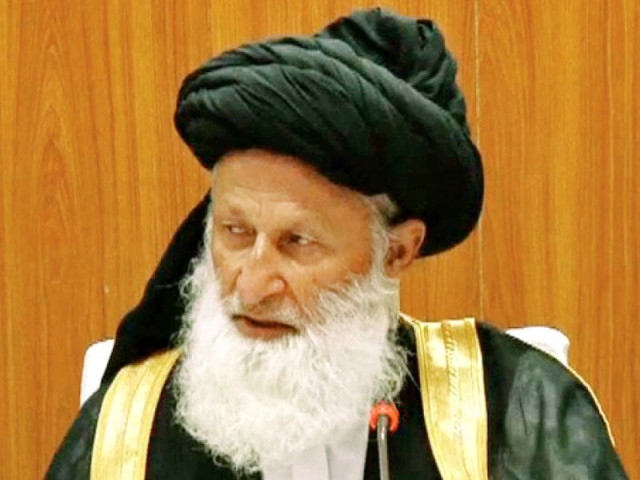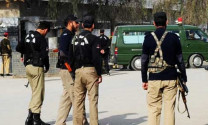Willing to review blasphemy law, says CII chief
Muhammad Khan Sherani says council will see whether sentences as harsh as the death penalty are fair

JUI-F lawmaker Maulana Sherani. PHOTO: FILE
Pakistan's religious and political elites almost universally keep clear of debating blasphemy laws in a country where criticism of Islam is a highly sensitive subject.
Two top clerics come to blows at CII meeting
Even rumours of blasphemy have sparked rampaging mobs and deadly riots. But Muhammad Khan Sherani, chairman of a body that advises the government on the compatibility of laws with Islam, told Reuters he was willing to reopen the debate and see whether sentences as harsh as the death penalty were fair.
"The government of Pakistan should officially, at the government level, refer the law on committing blasphemy to the Council of Islamic Ideology. There is a lot of difference of opinion among the clergy on this issue," Sherani said in an interview at his office close to Pakistan's parliament.
"Then the council can seriously consider things and give its recommendation of whether it needs to stay the same or if it needs to be hardened or if it needs to be softened," Sherani, dressed in a traditional black robe, said.
Women in Sheraniland
Sherani, who has hit the headlines in recent weeks after his council obstructed a bill to deter child marriages, did not disclose his own position.
Pakistan's blasphemy laws mandate the death penalty, although no sentence has been carried out. Critics say the law is abused in poor, rural areas by enemies falsely accusing others to settle personal scores. Presenting evidence in court can be considered a new infringement, so judges are reluctant to hear cases. Those acquitted have often been lynched.
Salmaan Taseer, a prominent liberal politician, was killed by his own bodyguard in 2011 after he had championed the cause of a Christian woman sentenced to death under the law.
One for the women: Civil society demands Centre to abolish CII
Child marriage
Sherani, a member of parliament representing Pakistan's largest Islamist party, the Jamiat Ulema-e-Islam, for some embodies Pakistan's struggle to balance modern, democratic ideals with pleasing conservative religious bodies demanding the imposition of strict Islamic law.
In recent years his 54-year old council has ruled DNA cannot be used as primary evidence in rape cases, and supported a law that requires woman alleging rape to get four male witnesses to testify in court before a case is heard. His members' decision this month to block a bill to impose harsher penalties for marrying off girls as young as eight or nine has angered human rights activists.
Bill aiming to ban child marriages shot down
Senators have since debated whether the council, in its current form, is right for the modern democratic Pakistan that Prime Minister Nawaz Sharif has said his country must represent. Sherani, head of the council since 2010, defended its recommendations, saying it was his job, as mandated by the constitution, to ensure the laws of the land were in line with Islam.
The council's advice is not binding. "The state should only be concerned up until a point with the question of marriage," he said.
"After reaching the age of maturity (puberty) the child has the right to reject a union." Three percent of girls in Pakistan are married before they turn 15 and 21 percent before age 18, according to UNICEF. Sherani said there were many un-Islamic laws on the statute book that he was advising the government to overturn, including presidential pardons for a murderer. Many of Pakistan's problems, including violence against religious minorities, were the result of the government failing to be sufficiently Islamic and instead pandering to the West, he said.
Women not required to cover faces, hands and feet under Sharia: CII
"Pakistan's present government is a defender of the interests of the West," Sherani said. "Don't equate what the government thinks to what Islam is."



















COMMENTS
Comments are moderated and generally will be posted if they are on-topic and not abusive.
For more information, please see our Comments FAQ